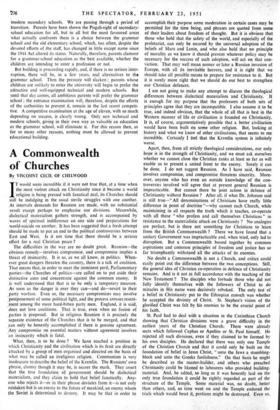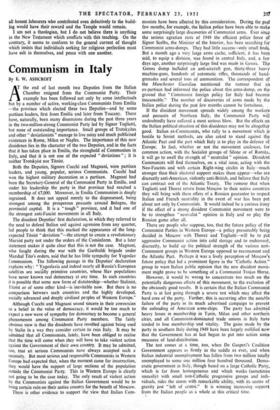A Commonwealth of Churches
By VISCOUNT CECIL OF CHELVVOOD
IT would seem incredible if it were not true that, at a time when the most violent attack on Christianity since it became a world religion is being pressed with fanatical zeal, its Churches should still be indulging in the usual sterile struggles with one another. At intervals demands for Reunion are made, with no substantial result except perhaps to emphasise our divisions. Meanwhile, dialectical materialism gathers strength, and is accompanied by waves of spiritual indifference on one side and preparations for world-suicide on another. It has been suggested that a fresh attempt should be made to put an end to the political controversies between East and West. Is it not time that there should be a serious effort for a real Christian peace ?
The difficulties in the way are no doubt great. Reunion—the obvious remedy—involves compromise. and compromise implies a threat of insincerity. It is so, as we all know, in politics. When- ever great dangers threaten the country, there is a talk of coalition. That means that, in order to meet the imminent peril, Parliamentary parties—the Churches of politics—are called on to put aside their distinctive aims and concentrate against the common enemy. It is well understood that that is to be only a temporary measure. As soon as the danger is over they can—and do—revert to their party warfare. Even so, the necessary compromises may involve postponement of some political fight, and the process arouses resent- ment among the more hard-bitten party men. England, it is said, does not love coalitions. That is true, even when no fusion of parties is proposed. But in religious Reunion it is precisely the separate existence of the Churches that is to be merged, and that can only be honestly accomplished if there is genuine agreement. Any compromise on essential matters without agreement involves an insincerity which is fatal.
What, then, is to be done ? We have reached a position in which Christianity and the civilisation which is its fruit are directly attacked by a group of men organised and directed on the basis of what may be called an irreligious religion. Communism is very inadequate to describe the belief of the Kremlin. The Russians' own phrase, clumsy though it may be, is nearer the mark. They assert that the true foundation of government should be dialectical materialism, and they claim to hold that belief fanatically. Any- one who rejects it—or in their phrase deviates from it—is not only mistaken but is an enemy to the future of mankind, an enemy whom the Soviet is determined to destroy. It may be that in order to accomplish their purpose some moderation in certain cases may be permitted for the time being, and phrases are quoted from some of their leaders about freedom of thought. But it is obvious that those who hold that the safety of the world, and especially of the proletariat, can only be secured by the universal adoption of the beliefs of Marx and Lenin, and who also hold that no principle of morality as we know it should prevent whatever policy may be necessary for the success of such adoption, will act on that con- viction. That may well mean sooner or later a Russian invasion of Europe, with all its inevitable horrors, and it is right that we should take all possible means to prepare for resistance to it. But it is surely more right that we should do our best to strengthen our Christian defences.
I am not going to make any attempt to discuss the theological differences between dialectical materialism and Christianity. It is enough for my purpose that the professors of both sets of principles agree that they are incompatible. I also assume it to be true, and indeed obvious, that the whole of all that is best in the Western manner of life or civilisation is founded on Christianity. It is, of course, argumentatively possible that a better civilisation would have been built on some other religion. But, looking at history and what we know of other civilisations, that seems to me incredible. Certainly I feel that the Kremlin system is infinitely worse.
Apart, then, from all strictly theological considerations, our only hope is in the strength of Christianity, and we must ask ourselves whether we cannot close the Christian ranks at least so far as will enable us to present a united front to the enemy. Surely it can be done. I do not suggest Reunion. As I have said, Reunion involves compromise, and compromise threatens sincerity. More- over, anyone who has even an outside knowledge of the con- troversies involved will agree that at present general Reunion is impracticable. But cannot there be joint action in defence of Christianity without Reunion ? After all, if what Dr. Johnson said is still true—" All denominations of Christians have really little difference in point of doctrine "—why cannot each Church, while maintaining in all respects the truth which it teaches, co-operate with all those " who profess and call themselves Christians " in resistance to the materialistic attack on Christianity ? No analogies are perfect, but is there not something for Christians to learn from the British Commonwealth ? There we have found that a unitary Government was impracticable and, when tried, only led to disruption. But a Commonwealth bound together by common aspirations and common principles of freedom and justice has so far triumphantly withstood all the attacks of its enemies.
No doubt a Commonwealth is not a Church, and critics could easily point out the difference between the two conceptions. Still, the general idea of Christian co-operation in defence of Christianity remains. And is it not in full accordance with the teaching of the New Testament 7 The disciples who forbade those who did not fully identify themselves with the followers of Christ to do miracles in His name were decisively rebuked. The only test of a belief in Christianity put to the Ethiopian eunuch was whether he accepted the divinity of Christ. St. Stephen's vision of the glorified Christ was felt by his enemies to be the crucial point of his faith.
St. Paul had to deal with a situation in the Corinthian Church showing that Christian divisions were a grave difficulty in the earliest years of the Christian Church. There were already sects which followed Cephas or Apollos or St. Paul himself. He rejected all such divisions, even if they claimed to be formed by his own disciples. He declared that there was only one Temple of the Christian Church and that it could only be built on the foundation of belief in Jesus Christ, " unto the Jews a stumbling- block and unto the Greeks foolishness." On that basis he might be described as the master-builder, and others who preached Christianity could be likened to labourers who provided building- material. And, he added, so long as it was honestly laid on the only true foundation it could be rightly regarded as part of the structure of the Temple. Some material was, no doubt, better than others, and, as time went on and the Temple endured the trials which would beset it, portions might be destroyed. Even so, all honest labourers who contributed even defectively to the build- ing would have their reward and the Temple would remain.
I am not a theologian, but I do not believe there is anything in the New Testament which conflicts with this teaching. On the contrary, it seems to conform to the general current of thought which insists that individuals seeking for religious perfection must have salt in themselves, and peace with one another.







































 Previous page
Previous page